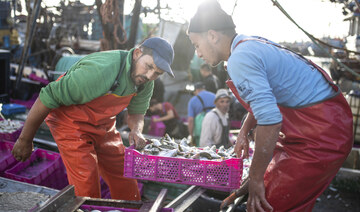RABAT: King Mohammed VI on Friday reaffirmed that settling sovereignty disputes over the Western Sahara remains the driving force behind Morocco’s foreign policy, lauding diplomatic triumphs and framing them as progress toward resolving the decades-long conflict in Morocco’s favor.
In an annual speech to members of parliament, the king noted that the United States, Spain and most recently France had backed Morocco’s autonomy plan for the disputed territory. He thanked President Emmanuel Macron for his “frank support for the ‘Moroccanness’ of the Sahara.”
“So it is that the French Republic supports Morocco’s sovereignty over the entire Sahara territory,” he said.
Mohammed VI invited Macron to visit Morocco after France shifted its position in July, a gesture reflecting how relations between Paris and Rabat have warmed.
The disputed territory, which Morocco considers to be its “southern provinces,” is among the most sensitive topics in the North African Kingdom and a common theme in royal speeches.
Morocco has pushed countries that partner with it economically and on security and managing migration to back its 2007 autonomy plan, which would grant it sovereignty over the region in question. Doing so, however, risks angering Algeria — a key player in the conflict as well as a security partner and gas supplier to many of the same countries.
The Western Sahara is a former colony that has been a lightning rod in regional politics since the 1970s. The United Nations categorizes it as among Africa’s last “non-self-governing territories” and has since 1979 considered a pro-independence movement called the Polisario Front to be a legitimate representative of the Sahrawi people.
Most of the territory is controlled by Morocco, while the Polisario operates out of refugee camps in Algeria, which supports it both financially and politically. Efforts to resolve the conflict span back to 1991, when the UN brokered a ceasefire and negotiations began over the territory’s future.
With discussions long stalled, Morocco has sought recognition among its political and economic allies while the Polisario has pursued legal routes, challenging Morocco’s claims in international courts.
The United States backed Morocco’s plan as part of an agreement that saw Morocco normalizing its ties with Israel in 2020. Countries including Saudi Arabia and 18 European Union members have since followed suit, according to Morocco’s tally.
In July, France amended its longstanding position to begin backing Morocco’s plan. Algeria subsequently withdrew its ambassador from France and its president indefinitely postponed a planned visit to Paris.
Weeks ago, Europe’s Court of Justice issued a ruling in favor of the Polisario, invalidating expired fishing and agricultural agreements between Morocco and the European Union pertaining to exports from the territory because they didn’t take the people of the Western Sahara into account.
Morocco has also recruited allies in the Middle East and Africa and struck ground on infrastructure projects including a territory-spanning highway and an Atlantic port that it plans to use to grow its influence as an Atlantic and African power.
Mohammed VI on Friday said Morocco’s African allies consider the territory “the heart of strategic continental initiatives,” including a planned pipeline extending from Nigeria and an initiative announced last year to give countries in the Sahel additional access to Atlantic trade routes.
“The fundamentals of Morocco’s position need to be explained to the small number of countries that continue to turn the logic of law on its head and deny the facts of history,” he told members of parliament.
The opening of parliament is one of the rare instances in which Mohammed VI gives public speeches. During his address, the king was flanked by his brother, Prince Moulay Rachid, and son, Prince Moulay Hassan, who is expected to succeed him.
The king spent much of the summer at a palace in the northern city of Tetouan, where he received Morocco’s central bank governor, Olympic Gold-winning runner Soufiane El Bakkali and celebrated the 25th anniversary of his ascension to the throne, according to Morocco’s state news agency.
Morocco’s King lauds new allies in Western Sahara dispute after European court ruling
https://arab.news/5gc32
Morocco’s King lauds new allies in Western Sahara dispute after European court ruling

- The king noted that the United States, Spain and most recently France had backed Morocco’s autonomy plan for the disputed territory
- “So it is that the French Republic supports Morocco’s sovereignty over the entire Sahara territory,” he said

























